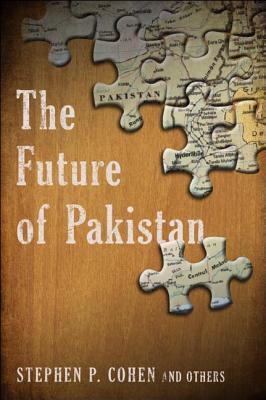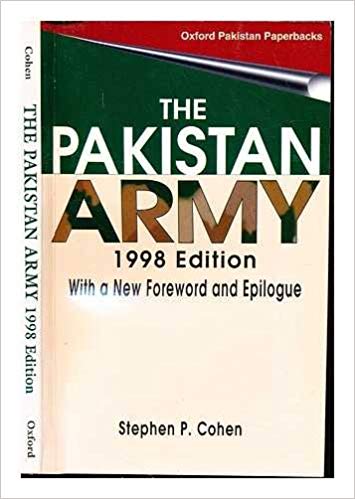
America’s leading expert on South Asia, Stephen P. Cohen of the Brookings Institution, has passed away, leaving behind a rich legacy of scholarship. Professor Christine Fair of Georgetown University summed up the sentiments of many when she tweeted that Steve was “the inimitable father of South Asian security studies.” She added, “All of us who work in this space owe our careers to him. He literally created this discipline.”
Prior to joining Brookings in 1998, Steve taught political science and history at the University of Illinois from 1965 to 1998. He was on the Policy Planning Staff at the U.S. Department of State in 1985-87. Along the way, he found time to teach in India, Japan, and Singapore.
I came to know of Steve in the early 1980s. I was an economist working at the Electric Power Research Institute in Palo Alto. As the saying goes, “You can take the man out of Pakistan but you cannot take Pakistan out of the man.” One day I discovered the Green Library at Stanford. One journal stood out: Asian Survey. Every year it published analytical reviews of the past year’s events that had transpired in key Asian countries, including Pakistan and India. Some were written by Steve.
https://www.youtube.com/watch?v=LNGZ7CmRWfA
In 1986, I wrote an op-ed in the Mercury News in which I reprised the authoritarian rule of Zulfikar Ali Bhutto. So I sent a copy of the article to Steve. He liked it. When he found out I had obtained my doctorate at UC Davis, he asked me if I knew Professor Eric Gustafson, a development economist who also wrote in the Asian Survey. Eric was responsible for bringing me to Davis from Karachi University so I knew him well. That’s how our relationship began.
Steve had a soft corner for President-General Zia ul-Haq. Thus, when Zia died in a plane crash in 1988, I saw Steve saying on TV that contrary to popular perceptions, Zia did not rule the country with an iron hand.
In October 1999 General Musharraf seized power. The former army chief, General Karamat was visiting Brookings during the following summer. I met him via an introduction from Steve. It was deftly handled. Steve gave me Karamat’s email address and said you write to him directly and request the interview. The general agreed to meet me.
I had started working on my book soon after Musharraf’s Kargil invasion, convinced that Pakistan needed to change its strategic culture. I interviewed Gen. Karamat for an hour. He began by saying that anyone who did not support Musharraf’s coup was not a patriot but admitted that any time the military seizes power, the minority provinces get restless. We covered a number of topics. At the end, I asked him what happened to General Zia’s plane. He said his death was accidental. I was stunned. Then he escorted me to the elevators.
A year later I was in Washington again. This time I met Steve in his office. He said you are sitting in the chair in which Benazir Bhutto sat recently. Not knowing what that meant, I shifted to the next chair. We talked about Pakistan. Toward the end, I asked him about Zia’s death. He went silent. Then he said the army blames the air force and the air force blames the army. I asked which army and air force. He said you know which ones I am talking about.
Our next encounter was at Stanford in 2002. Professor Scott Sagan had organized a conference to discuss ways of resolving the tension that erupted between India and Pakistan following the December 2001 attack on the Indian parliament in New Delhi. A million men were posted on the border and the chronic tension between two adversaries was at an all-time high because this time they were overtly armed with nuclear weapons.

The conference convinced me that I needed to finish my book fast. When the manuscript, entitled Rethinking the National Security of Pakistan, was almost done, I sent it to Steve along with a few others. He provided some very helpful comments. His name helped me find a publisher. I had almost no track record in the field and was not a political scientist. The book came out in 2003 in the UK. And on the back of the book was an endorsement by Steve.
He liked the scenarios I had laid out in my book. These had been initially developed for a workshop organized by Professor Ehsan Ahrari at the US Army War College’s Institute for Strategic Studies. It took place in Washington in the summer of 2001, just a few months prior to 9/11. Steve expounded his own scenarios in a book that he later wrote about Pakistan.
A year or two later I organized a conference in Washington to discuss the Kashmir issue. It was sponsored by the American Institute of International Studies, a virtual think tank. Steve spoke at the conference and tended to agree with a comment I had made that the fight over Kashmir was akin to two bald men fighting over a comb. He also called me a virtual scholar.

A year or two later, I called into a Brookings webinar by Steve on the Kashmir crisis and asked him a question. His answer prompted me to ask a second question. At that point he reminded me, in jest, that only a single question was allowed per participant but then proceeded to answer the second question.
Over the years, we had numerous email exchanges. He always responded to my queries in the most unassuming manner. My last contact was with him a few years ago when I had sent him another article of mine. His response surprised me. He said he now spending his time on other activities. Attached was a charming picture of him with his grandkids.
Steve’s contributions to the literature on South Asian security studies are legion and his place in history is secure. I reviewed his enlightening book, “The Idea of Pakistan,” for the Asia Times and later for the Daily Times. My reviews had many positive comments and a few negative ones. I sent him the reviews as they came out. He thanked me each time and never disputed my comments.
In Steve’s storied career, he made many trenchant observations about Pakistan. Here’s one that has stayed with me: “The largest political party in Pakistan is the army.” I long for the day when Steve’s observation will become obsolete.
Prior to joining Brookings in 1998, Steve taught political science and history at the University of Illinois from 1965 to 1998. He was on the Policy Planning Staff at the U.S. Department of State in 1985-87. Along the way, he found time to teach in India, Japan, and Singapore.
I came to know of Steve in the early 1980s. I was an economist working at the Electric Power Research Institute in Palo Alto. As the saying goes, “You can take the man out of Pakistan but you cannot take Pakistan out of the man.” One day I discovered the Green Library at Stanford. One journal stood out: Asian Survey. Every year it published analytical reviews of the past year’s events that had transpired in key Asian countries, including Pakistan and India. Some were written by Steve.
https://www.youtube.com/watch?v=LNGZ7CmRWfA
In 1986, I wrote an op-ed in the Mercury News in which I reprised the authoritarian rule of Zulfikar Ali Bhutto. So I sent a copy of the article to Steve. He liked it. When he found out I had obtained my doctorate at UC Davis, he asked me if I knew Professor Eric Gustafson, a development economist who also wrote in the Asian Survey. Eric was responsible for bringing me to Davis from Karachi University so I knew him well. That’s how our relationship began.
Steve had a soft corner for President-General Zia ul-Haq. Thus, when Zia died in a plane crash in 1988, I saw Steve saying on TV that contrary to popular perceptions, Zia did not rule the country with an iron hand.
In October 1999 General Musharraf seized power. The former army chief, General Karamat was visiting Brookings during the following summer. I met him via an introduction from Steve. It was deftly handled. Steve gave me Karamat’s email address and said you write to him directly and request the interview. The general agreed to meet me.
I had started working on my book soon after Musharraf’s Kargil invasion, convinced that Pakistan needed to change its strategic culture. I interviewed Gen. Karamat for an hour. He began by saying that anyone who did not support Musharraf’s coup was not a patriot but admitted that any time the military seizes power, the minority provinces get restless. We covered a number of topics. At the end, I asked him what happened to General Zia’s plane. He said his death was accidental. I was stunned. Then he escorted me to the elevators.
A year later I was in Washington again. This time I met Steve in his office. He said you are sitting in the chair in which Benazir Bhutto sat recently. Not knowing what that meant, I shifted to the next chair. We talked about Pakistan. Toward the end, I asked him about Zia’s death. He went silent. Then he said the army blames the air force and the air force blames the army. I asked which army and air force. He said you know which ones I am talking about.
Our next encounter was at Stanford in 2002. Professor Scott Sagan had organized a conference to discuss ways of resolving the tension that erupted between India and Pakistan following the December 2001 attack on the Indian parliament in New Delhi. A million men were posted on the border and the chronic tension between two adversaries was at an all-time high because this time they were overtly armed with nuclear weapons.

The conference convinced me that I needed to finish my book fast. When the manuscript, entitled Rethinking the National Security of Pakistan, was almost done, I sent it to Steve along with a few others. He provided some very helpful comments. His name helped me find a publisher. I had almost no track record in the field and was not a political scientist. The book came out in 2003 in the UK. And on the back of the book was an endorsement by Steve.
He liked the scenarios I had laid out in my book. These had been initially developed for a workshop organized by Professor Ehsan Ahrari at the US Army War College’s Institute for Strategic Studies. It took place in Washington in the summer of 2001, just a few months prior to 9/11. Steve expounded his own scenarios in a book that he later wrote about Pakistan.
A year or two later I organized a conference in Washington to discuss the Kashmir issue. It was sponsored by the American Institute of International Studies, a virtual think tank. Steve spoke at the conference and tended to agree with a comment I had made that the fight over Kashmir was akin to two bald men fighting over a comb. He also called me a virtual scholar.

A year or two later, I called into a Brookings webinar by Steve on the Kashmir crisis and asked him a question. His answer prompted me to ask a second question. At that point he reminded me, in jest, that only a single question was allowed per participant but then proceeded to answer the second question.
Over the years, we had numerous email exchanges. He always responded to my queries in the most unassuming manner. My last contact was with him a few years ago when I had sent him another article of mine. His response surprised me. He said he now spending his time on other activities. Attached was a charming picture of him with his grandkids.
Steve’s contributions to the literature on South Asian security studies are legion and his place in history is secure. I reviewed his enlightening book, “The Idea of Pakistan,” for the Asia Times and later for the Daily Times. My reviews had many positive comments and a few negative ones. I sent him the reviews as they came out. He thanked me each time and never disputed my comments.
In Steve’s storied career, he made many trenchant observations about Pakistan. Here’s one that has stayed with me: “The largest political party in Pakistan is the army.” I long for the day when Steve’s observation will become obsolete.
